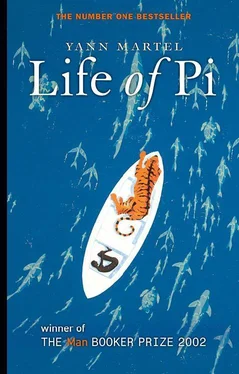Yann Martel - Life of Pi
Здесь есть возможность читать онлайн «Yann Martel - Life of Pi» весь текст электронной книги совершенно бесплатно (целиком полную версию без сокращений). В некоторых случаях можно слушать аудио, скачать через торрент в формате fb2 и присутствует краткое содержание. Год выпуска: 2002, ISBN: 2002, Издательство: Canongate Books, Жанр: Современная проза, на английском языке. Описание произведения, (предисловие) а так же отзывы посетителей доступны на портале библиотеки ЛибКат.
- Название:Life of Pi
- Автор:
- Издательство:Canongate Books
- Жанр:
- Год:2002
- ISBN:9781847674210
- Рейтинг книги:3 / 5. Голосов: 1
-
Избранное:Добавить в избранное
- Отзывы:
-
Ваша оценка:
- 60
- 1
- 2
- 3
- 4
- 5
Life of Pi: краткое содержание, описание и аннотация
Предлагаем к чтению аннотацию, описание, краткое содержание или предисловие (зависит от того, что написал сам автор книги «Life of Pi»). Если вы не нашли необходимую информацию о книге — напишите в комментариях, мы постараемся отыскать её.
Life of Pi — читать онлайн бесплатно полную книгу (весь текст) целиком
Ниже представлен текст книги, разбитый по страницам. Система сохранения места последней прочитанной страницы, позволяет с удобством читать онлайн бесплатно книгу «Life of Pi», без необходимости каждый раз заново искать на чём Вы остановились. Поставьте закладку, и сможете в любой момент перейти на страницу, на которой закончили чтение.
Интервал:
Закладка:
It was the only pool that made Mamaji fall silent, his memory making too many lengths to mention.
Mamaji remembered, Father dreamed.
That is how I got my name when I entered this world, a last, welcome addition to my family, three years after Ravi: Piscine Molitor Patel.
CHAPTER 4
Our good old nation was just seven years old as a republic when it became bigger by a small territory. Pondicherry entered the Union of India on November 1, 1954. One civic achievement called for another. A portion of the grounds of the Pondicherry Botanical Garden was made available rent-free for an exciting business opportunity and—lo and behold—India had a brand new zoo, designed and run according to the most modern, biologically sound principles.
It was a huge zoo, spread over numberless acres, big enough to require a train to explore it, though it seemed to get smaller as I grew older, train included. Now it’s so small it fits in my head. You must imagine a hot and humid place, bathed in sunshine and bright colours. The riot of flowers is incessant. There are trees, shrubs and climbing plants in profusion—peepuls, gulmohurs, flames of the forest, red silk cottons, jacarandas, mangoes, jackfruits and many others that would remain unknown to you if they didn’t have neat labels at their feet. There are benches. On these benches you see men sleeping, stretched out, or couples sitting, young couples, who steal glances at each other shyly and whose hands flutter in the air, happening to touch. Suddenly, amidst the tall and slim trees up ahead, you notice two giraffes quietly observing you. The sight is not the last of your surprises. The next moment you are startled by a furious outburst coming from a great troupe of monkeys, only outdone in volume by the shrill cries of strange birds. You come to a turnstile. You distractedly pay a small sum of money. You move on. You see a low wall. What can you expect beyond a low wall? Certainly not a shallow pit with two mighty Indian rhinoceros. But that is what you find. And when you turn your head you see the elephant that was there all along, so big you didn’t notice it. And in the pond you realize those are hippopotamuses floating in the water. The more you look, the more you see. You are in Zootown!
Before moving to Pondicherry, Father ran a large hotel in Madras. An abiding interest in animals led him to the zoo business. A natural transition, you might think, from hotelkeeping to zookeeping. Not so. In many ways, running a zoo is a hotelkeeper’s worst nightmare. Consider: the guests never leave their rooms; they expect not only lodging but full board; they receive a constant flow of visitors, some of whom are noisy and unruly. One has to wait until they saunter to their balconies, so to speak, before one can clean their rooms, and then one has to wait until they tire of the view and return to their rooms before one can clean their balconies; and there is much cleaning to do, for the guests are as unhygienic as alcoholics. Each guest is very particular about his or her diet, constantly complains about the slowness of the service, and never, ever tips. To speak frankly, many are sexual deviants, either terribly repressed and subject to explosions of frenzied lasciviousness or openly depraved, in either case regularly affronting management with gross outrages of free sex and incest. Are these the sorts of guests you would want to welcome to your inn? The Pondicherry Zoo was the source of some pleasure and many headaches for Mr. Santosh Patel, founder, owner, director, head of a staff of fifty-three, and my father.
To me, it was paradise on earth. I have nothing but the fondest memories of growing up in a zoo. I lived the life of a prince. What maharaja’s son had such vast, luxuriant grounds to play about? What palace had such a menagerie? My alarm clock during my childhood was a pride of lions. They were no Swiss clocks, but the lions could be counted upon to roar their heads off between five-thirty and six every morning. Breakfast was punctuated by the shrieks and cries of howler monkeys, hill mynahs and Moluccan cockatoos. I left for school under the benevolent gaze not only of Mother but also of bright-eyed otters and burly American bison and stretching and yawning orang-utans. I looked up as I ran under some trees, otherwise peafowl might excrete on me. Better to go by the trees that sheltered the large colonies of fruit bats; the only assault there at that early hour was the bats’ discordant concerts of squeaking and chattering. On my way out I might stop by the terraria to look at some shiny frogs glazed bright, bright green, or yellow and deep blue, or brown and pale green. Or it might be birds that caught my attention: pink flamingoes or black swans or one-wattled cassowaries, or something smaller, silver diamond doves, Cape glossy starlings, peach-faced lovebirds, Nanday conures, orange-fronted parakeets. Not likely that the elephants, the seals, the big cats or the bears would be up and doing, but the baboons, the macaques, the mangabeys, the gibbons, the deer, the tapirs, the llamas, the giraffes, the mongooses were early risers. Every morning before I was out the main gate I had one last impression that was both ordinary and unforgettable: a pyramid of turtles; the iridescent snout of a mandrill; the stately silence of a giraffe; the obese, yellow open mouth of a hippo; the beak-and-claw climbing of a macaw parrot up a wire fence; the greeting claps of a shoebill’s bill; the senile, lecherous expression of a camel. And all these riches were had quickly, as I hurried to school. It was after school that I discovered in a leisurely way what it’s like to have an elephant search your clothes in the friendly hope of finding a hidden nut, or an orang-utan pick through your hair for tick snacks, its wheeze of disappointment at what an empty pantry your head is. I wish I could convey the perfection of a seal slipping into water or a spider monkey swinging from point to point or a lion merely turning its head. But language founders in such seas. Better to picture it in your head if you want to feel it.
In zoos, as in nature, the best times to visit are sunrise and sunset. That is when most animals come to life. They stir and leave their shelter and tiptoe to the water’s edge. They show their raiments. They sing their songs. They turn to each other and perform their rites. The reward for the watching eye and the listening ear is great. I spent more hours than I can count a quiet witness to the highly mannered, manifold expressions of life that grace our planet. It is something so bright, loud, weird and delicate as to stupefy the senses.
I have heard nearly as much nonsense about zoos as I have about God and religion. Well-meaning but misinformed people think animals in the wild are “happy” because they are “free”. These people usually have a large, handsome predator in mind, a lion or a cheetah (the life of a gnu or of an aardvark is rarely exalted). They imagine this wild animal roaming about the savannah on digestive walks after eating a prey that accepted its lot piously, or going for callisthenic runs to stay slim after overindulging. They imagine this animal overseeing its offspring proudly and tenderly, the whole family watching the setting of the sun from the limbs of trees with sighs of pleasure. The life of the wild animal is simple, noble and meaningful, they imagine. Then it is captured by wicked men and thrown into tiny jails. Its “happiness” is dashed. It yearns mightily for “freedom” and does all it can to escape. Being denied its “freedom” for too long, the animal becomes a shadow of itself, its spirit broken. So some people imagine.
This is not the way it is.
Animals in the wild lead lives of compulsion and necessity within an unforgiving social hierarchy in an environment where the supply of fear is high and the supply of food low and where territory must constantly be defended and parasites forever endured. What is the meaning of freedom in such a context? Animals in the wild are, in practice, free neither in space nor in time, nor in their personal relations. In theory—that is, as a simple physical possibility—an animal could pick up and go, flaunting all the social conventions and boundaries proper to its species. But such an event is less likely to happen than for a member of our own species, say a shopkeeper with all the usual ties—to family, to friends, to society—to drop everything and walk away from his life with only the spare change in his pockets and the clothes on his frame. If a man, boldest and most intelligent of creatures, won’t wander from place to place, a stranger to all, beholden to none, why would an animal, which is by temperament far more conservative? For that is what animals are, conservative, one might even say reactionary. The smallest changes can upset them. They want things to be just so, day after day, month after month. Surprises are highly disagreeable to them. You see this in their spatial relations. An animal inhabits its space, whether in a zoo or in the wild, in the same way chess pieces move about a chessboard—significantly. There is no more happenstance, no more “freedom”, involved in the whereabouts of a lizard or a bear or a deer than in the location of a knight on a chessboard. Both speak of pattern and purpose. In the wild, animals stick to the same paths for the same pressing reasons, season after season. In a zoo, if an animal is not in its normal place in its regular posture at the usual hour, it means something. It may be the reflection of nothing more than a minor change in the environment. A coiled hose left out by a keeper has made a menacing impression. A puddle has formed that bothers the animal. A ladder is making a shadow. But it could mean something more. At its worst, it could be that most dreaded thing to a zoo director: a symptom , a herald of trouble to come, a reason to inspect the dung, to cross-examine the keeper, to summon the vet. All this because a stork is not standing where it usually stands!
Читать дальшеИнтервал:
Закладка:
Похожие книги на «Life of Pi»
Представляем Вашему вниманию похожие книги на «Life of Pi» списком для выбора. Мы отобрали схожую по названию и смыслу литературу в надежде предоставить читателям больше вариантов отыскать новые, интересные, ещё непрочитанные произведения.
Обсуждение, отзывы о книге «Life of Pi» и просто собственные мнения читателей. Оставьте ваши комментарии, напишите, что Вы думаете о произведении, его смысле или главных героях. Укажите что конкретно понравилось, а что нет, и почему Вы так считаете.












